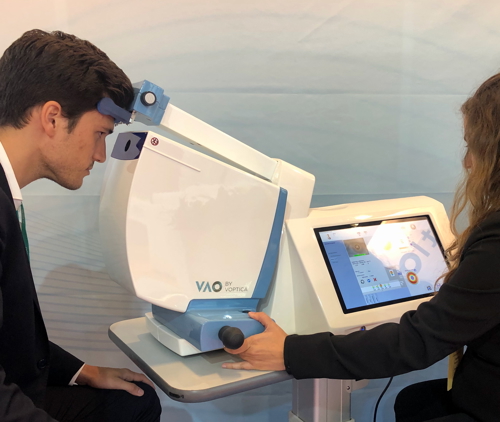Cataract, Refractive, Cataract and Refractive Articles, IOL
Advances in Adaptive Optics
New tools allow better preoperative prediction and greater customisation.

Timothy Norris
Published: Wednesday, January 1, 2025
Cataract and refractive surgery can be even more customisable, increasing performance and visual results at all distances when adding a correct prediction of the patient’s visual experience to the formula, according to Pablo Artal PhD.
He asserted this customisation needs to be central in present and future surgery because of its importance for today’s IOL selection and its service as a core concept for designing future lenses. In standard clinical practice, IOL selection is based on biometry results and the surgeon’s experience, focusing on just the optics—a concern for Professor Artal for the last 25 years. This has led him to think outside the box for ways to improve customisation.
What he came up with is a pretty straightforward solution: collecting data from the geometry of the eye, biometry, topography, and intraocular lens geometry using a Purkinje meter, and using raytracing for the prediction of wavefront optical aberration and chromatic modelling. While extremely important, he added these pure optical measurements are still not enough.
The visual experience must be the final ingredient, something he has been working on for many years with his start-up company Voptica SL. They developed VAO, a novel adaptive optics simulator that allows patients to experience different optics so evaluators can obtain precise measurements. It is a conceptually simple technology that uses a spatial light modulator to manipulate the wavefront of the light during visual testing. This allows, for example, optimisation of the amount of spherical aberration that can be induced either in the cornea or through an intraocular lens, aiming for a perfect balance between depth of focus and distance quality of vision.
It’s not magic, he said, but a very important way to consider neural responses and an incredibly useful tool to make a more precise optical prediction and choose the best lens for the patient.
This approach allows the surgeon to find what Prof Artal described as the “sweetest spot” for the patient—an optimised visual acuity at far and near—and essential information on the most suitable lens type. Thanks to this testing, evaluations can be done preoperatively to avoid many refractive surprises as well as unhappy patients.
The combination of conventional optics and the results of the patient’s visual experience obtained with an adaptive optics visual simulation can provide the surgeon with ways to optimise the outcomes. Prof Artal suggested the process could soon become extremely useful for designing new lenses and a better understanding of patient selection.
Prof Artal presented at the 2024 ESCRS Congress in Barcelona.
Pablo Artal PhD is a physicist and full professor specialised in optics at the University of Murcia, Spain. pablo@um.es